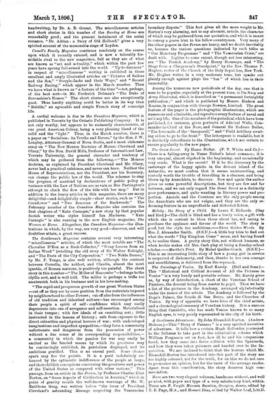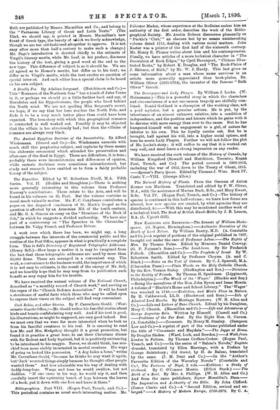A Gentleman Adventurer. By John Bloundell-Burton. (Andrew Melrose.)—This "Story of
Panama" is a very spirited narrative of adventure. It tells how a certain Hugh Bellenden journeyed to the Isthmus to take part in the colonisation scheme which William Fergusson set on foot, how ill he and his companions fared, how they came into fierce collision with the Spaniards, and how they wore taken prisoners and handed over to the In- quisition. We are inclined to think that the horrors which Mr. Bloundell-Burton has introduced into this part of the story are too highly coloured, not for the truth, for on this we do not care to pronounce an opinion, but for the taste of the average reader. Apart from this consideration, the story deserves high com- mendation.
Here are two very elegant volumes, handsome without, and well pented, with paper and type of a very satisfactory kind, within. These are P. Vergili Maronis Bues/i4a, Georgica, Aeneis, edited by T. E. Page, M.A., and Homeri 11w., eeited by Walter Leaf, Litt.D. Both are published by Messrs. Macmillan and Co., and belong to the "Parnassus Library of Greek and Latin Texts." (The Iliad, we should say, is printed in Messrs. Macmillan's new fount of Greek type, the beauty of which we freely acknowledge, though we are too old-fashioned altogether to approve. It is not easy after more than half a century to make such a change.) Mr. Page's introduction is devoted chiefly to the estimate of Virgil's literary merits, while Mr. Leaf, in his preface, discusses the history of the text, giving a good word at the end to the new type. This difference of subject is as it should be. We are all agreed as to Homer's merits, but differ as to his text; we differ as to Virgil's merits, while the text excites no question of special intersst. And each editor has a special claim to be heard on his own subject.







































 Previous page
Previous page